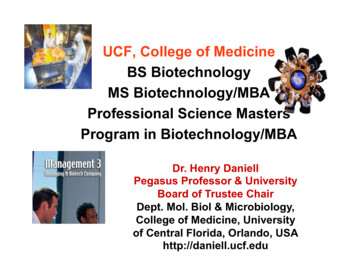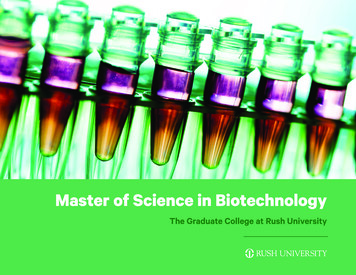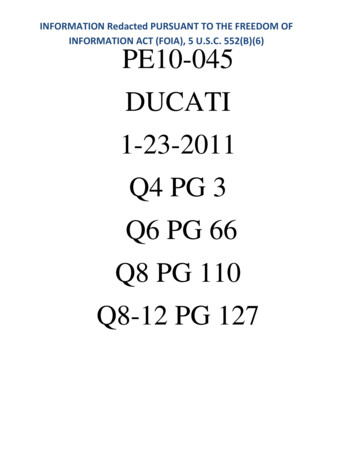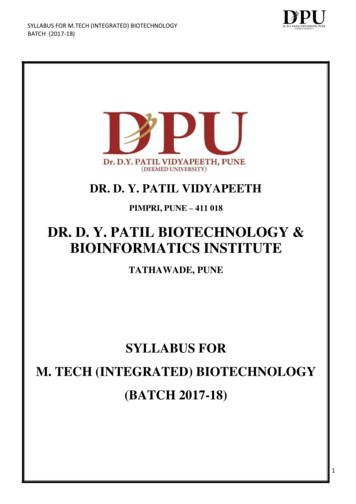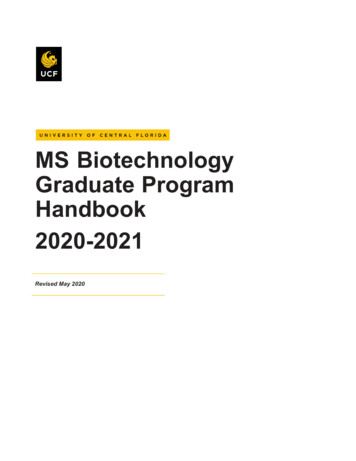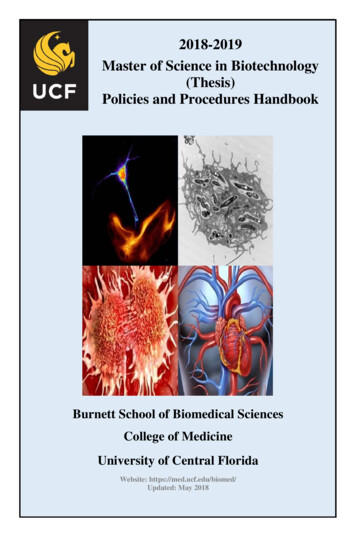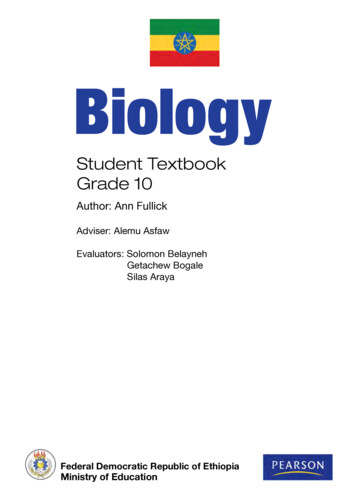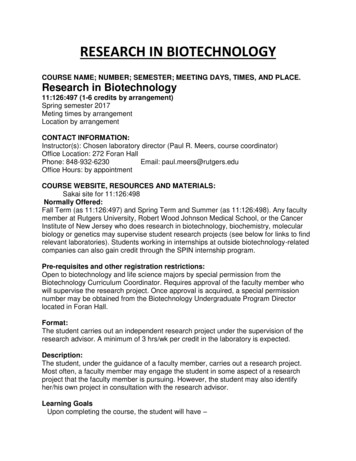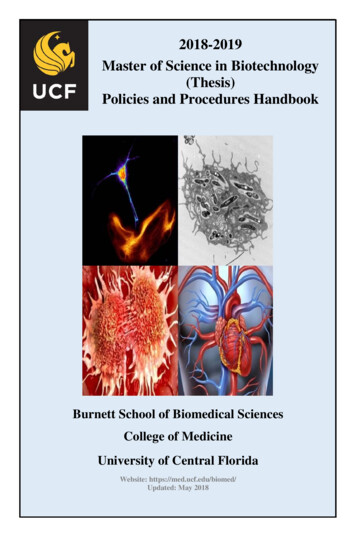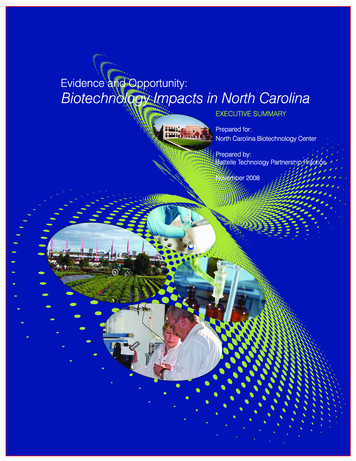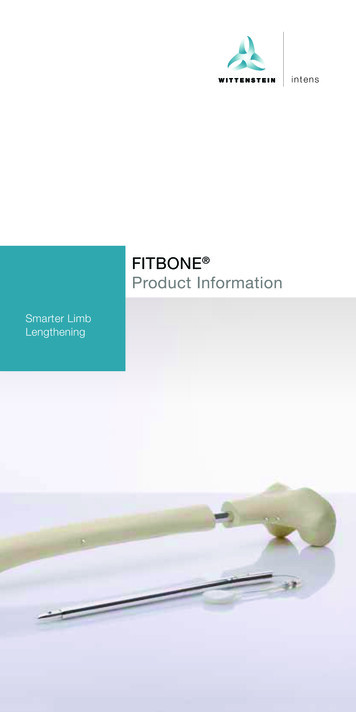
Transcription
BIOTECHNOLOGY (Code No. 045)An unprecedented growth of human knowledge in the field of Biological Sciences coupled withequally significant developments in the field of technology have brought significant changes intoexisting social and economic systems. The emerging field of Biotechnology is likely to furtherenhance the applications of Science and Technology in the service of human welfare. ModernBiotechnology processes encompass a wide range of new products such as antibiotics, vaccines,monoclonal antibodies and many more. Furthermore, developments in recombinant DNAtechnology have yielded numerous new useful products in the fields of healthcare and agriculture.The present syllabus takes care of all these aspects. Due emphasis has been laid on familiarizingthe learners with the fundamental concepts, basic techniques and their applications. It is expectedthat the knowledge gained through the study of different topics and the skills acquired through theprescribed practical work will make the learners competent to meet the challenges of academic aswell as professional courses after studying the subject at senior secondary stage.ObjectivesThe broad objectives of teaching Biotechnology at senior secondary level are to: help the learners know and understand basic facts and concepts of the subject atelementary stage.expose the students to different basic processes and basic techniques used inBiotechnology.familiarize the learners to understand the relationship of the subject to health, nutrition,environment, agriculture and industry, etc.develop conceptual competence in the learners so as to cope up with professional coursesin future career.acquaint students with different applications of Biotechnology in everyday life.develop an interest in students to study biotechnology as a discipline.CLASS- XI (2019-20)COURSE STRUCTUREOne PaperUnitsUnit- IUnit-IIUnit-IIIUnit-IVTime: 3 hrs.Max. Marks 70 30Marks520202530100Biotechnology: An overviewMolecules of LifeGenetics and Molecular BiologyCells and OrganismsPracticalTotal1No. of Periods2050506060240
BIOTECHNOLOGY (Code No. 045)CLASS XI(Theory)One PaperTotal Marks: 70Time: 3 hrs.Unit-I Biotechnology: An overview5 MarksChapter 1: Biotechnology: An OverviewHistorical Perspectives, Technology and Applications of Biotechnology, Global market and BiotechProducts, Public Perception of Biotechnology, Biotechnology in India and Global TrendsUnit-II Molecules of Life20 MarksChapter 1: Biomolecules: Building BlocksBuilding Blocks of Carbohydrates - Sugars and their Derivatives, Building Blocks of Proteins - AminoAcids, Building Blocks of Lipids - Simple Fatty Acids, Sphingosine,Glycerol and Cholesterol, Building Blocks of Nucleic Acids - Nucleotides, Biochemical TransformationsChapter 2: Macromolecules: Structure & FunctionCarbohydrates - The Energy Givers, Proteins - The Performers, Enzymes - The Catalysts, Lipids andBiomembranes - The Barriers, Nucleic Acids - The ManagersUnit-III Genetics and Molecular Biology20 MarksChapter 1: Concepts of GeneticsHistorical Perspective, Multiple Alleles, Linkage and Crossing Over, Genetic Mapping, Gene Interaction, SexLinked Inheritance, Extra nuclear Inheritance, Quantitative Inheritance, Genes at the Population LevelChapter 2: Genes and Genomes: Structure and FunctionDiscovery of DNA as Genetic Material, DNA Replication, Fine Structure of the Genes, From Gene toProtein, Transcription – The Basic Process, Genetic Code, Translation, Regulation of GeneExpression, Mutations, DNA Repair, Human Genetic Disorders, Genome OrganizationUnit IV: Cells and Organisms25 MarksChapter 1 The Basic Unit of LifeCell Structure and Components, Tissues and Organs, Stem Cells, Biodiversity, Organization of LifeChapter 2: Cell Growth and DevelopmentCell Division, Cell Cycle, Cell Communication, Nutrition, Gaseous Exchange, Internal Transport, Maintaining the InternalEnvironment, Reproduction, In Vitro Fertilization, Animal and Plant Development, Immune Response in Animals,Programmed Cell Death, Defense Mechanisms in Plants2
BIOTECHNOLOGY (Code No. 045)PRACTICALSNote: Every student is required to do the following experiments during the academic session.1.Recording practical results and safety rules in the laboratory2.Preparation of buffers and pH determination3.Sterilization techniques4.Preparation of bacterial growth medium5.Determination of bacterial growth curve6.Cell counting7.Isolation of milk protein (Casein)8.Estimation of whey protein by biuret method9.Assaying the enzyme acid phosphate10. Estimation of blood glucose by enzymatic and glucometer method(GOD/POD)11. Study of various stages of mitosis and calculation of mitotic index12. Preparation of karyotypeScheme of EvaluationTime: 3 HoursMax. Marks 30The scheme of evaluation at the end of session will be as under:Two experiments: 20 MarksViva on experiments:5 MarksPractical record:5 Marks3
BIOTECHNOLOGY (Code No. 045)CLASS XII (2019-20)COURSE- STRUCTURE-(THEORY)One PaperMax. Marks 70 30Time: 3 hrs.UnitsUnit VUnit VIProtein and Gene ManipulationCell Culture and Genetic ManipulationPracticalsTotalNo. ofPeriods1008060240One paperTotal Marks: 70Marks403030100Time: 3 hrs.Unit-V Protein and Gene Manipulation40 MarksChapter-1: Recombinant DNA TechnologyIntroduction, Tool of DNA technology, Making DNA, Introduction of recombinant DNA into host cells,Identification of Recombinants, Polymerase Chain Reaction (PCR), Hybridization Techniques, DNA Library,DNA Sequencing, Site-directed MutagenesisChapter-2: Protein Structure and EngineeringIntroduction to the world of proteins, 3-D shape of proteins, Structure-Function Relationship in Proteins,Purification of Proteins, Characterization of Proteins, Protein Based Products, Designing Proteins (ProteinEngineering)Chapter-3: Genomics, Proteomics and BioinformaticsIntroduction, Genome, Sequencing Projects, Gene prediction and counting, Genome Similarity, SNPs andComparative Genomics, Functional Genomics, Proteomics, History of Bioinformatics, Sequences andnomenclature, Information Sources, Analysis using Bioinformatics toolsUnit-VI Cell Culture and Genetic Manipulation30 MarksChapter-1: Microbial Cell Culture and its ApplicationsIntroduction, Microbial Nutrition and Culture Techniques, Measurement and Kinetics of Microbial Growth,Scale-up of Microbial Process, Isolation of Microbial Products, Strain Isolation and Improvement,Applications of Microbial Culture Technology, Biosafety Issues in Microbial Technology4
BIOTECHNOLOGY (Code No. 045)Chapter -2: Plant Cell Culture and ApplicationsIntroduction, Cell and Tissue Culture Techniques, Applications of Cell and Tissue Culture, Gene TransferMethods in Plants, Transgenic Plants with Beneficial Traits, Biosafety of Transgenic PlantsChapter-3: Animal Cell Culture and ApplicationsIntroduction, Animal Cell Culture Techniques, Characterization of Cell lines, Methods of Gene Delivery intoCells, Scale-up of Animal Culture Process, Applications of Animal Cell Culture, Stem Cell Technology, TissueEngineeringPRACTICALS30 MarksNote: Every student will be required to do the following experiments during the academic session.1.2.3.4.5.6.7.8.9.10.Use of special equipment in biotechnology experimentsIsolation of bacterial plasmid DNADetection of DNA by gelelectrophoresesIsolation of Genomic DNA (CTAB method)Estimation of DNABacterial transformation using any plasmidRestriction digestion of plasmid DNA & its analysis by gelelectrophoresisIsolation of bacteria from curd & staining of bacteriaCell viability assayData retrieval and database search using internet site NCBI and download a DNA and proteinsequence from internet, analyze it and comment on it11. Reading of a DNA sequencing gel to arrive at the sequence12.Project workScheme of EvaluationTime: 3 HoursMax. Marks 30The scheme of evaluation at the end of the session will be as under:ABTwo experimentsPractical recordViva on PracticalProject workWrite upViva on projectTotal6 6 (only one computer based practical)04040505305
BIOTECHNOLOGY (Code No. 045)Prescribed Books:1. A Text Book of Biotechnology - Class XI : Published by CBSE, New Delhi2. A Laboratory Manual of Biotechnology - Class XI : Published by CBSE, New Delhi3. A Text Book of Biotechnology - Class XII : Published by CBSE, New Delhi4. A Laboratory Manual of Biotechnology - Class XII : Published by CBSE, New Delhi6
BIOTECHNOLOGY (Code No. 045)QUESTION PAPER DESIGNClass – XI/XII (2019-20)1) Board Examination – TheoryTime: 3 HoursS.No.1.2.3.4.5.Typology of QuestionsRemembering- Exhibit memory ofpreviously learned material byrecalling facts, terms, basic concepts,and answers.UnderstandingDemonstrateunderstanding of facts and ideas byorganizing, comparing, translating,interpreting, giving descriptions andstating main ideasApplying: Solve problems to newsituations by applying acquiredknowledge, facts, techniques and rulesin a different way.Analyzing & Evaluating: Examineand break information into parts byidentifying motives or causes. Makeinferences and evidence to supportgeneralizationsPresent and defend opinions bymaking judgment about information,validity of ideas or quality of workbased on a set of criteria.Creating:Compileinformationtogether in a different way bycombining elements in a new patternor proposing alternative solutionsTOTALMax. Marks: 70VSA(1 Marks)SA-I(2 Marks)SA-II(3 marks)LA(5 marks)51214121311122112115x1 157x2 147x3 212) Practical : 30 marks1Percent-age9 (18)25.7%8 (17)24.3%6 (13)6 (14)-4 (8)4x5 1570Duration : 3 hours7TotalMarks18.5%20%11.5%
existing social and economic systems. The emerging field of Biotechnology is likely to further enhance the applications of Science and Technology in the service of human welfare. Modern Biotechnology processes encompass a wide range of new products such as antibiotics, vaccines, monoclonal antibodies and many more.
